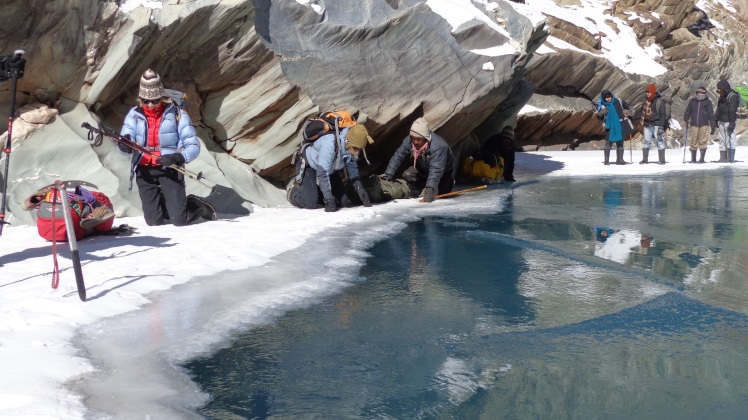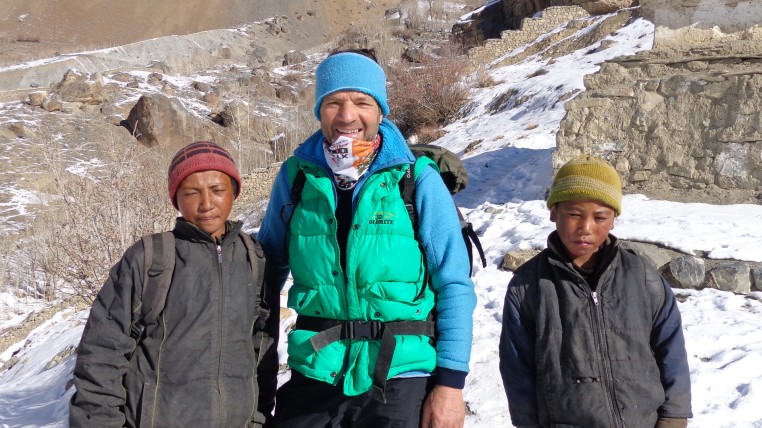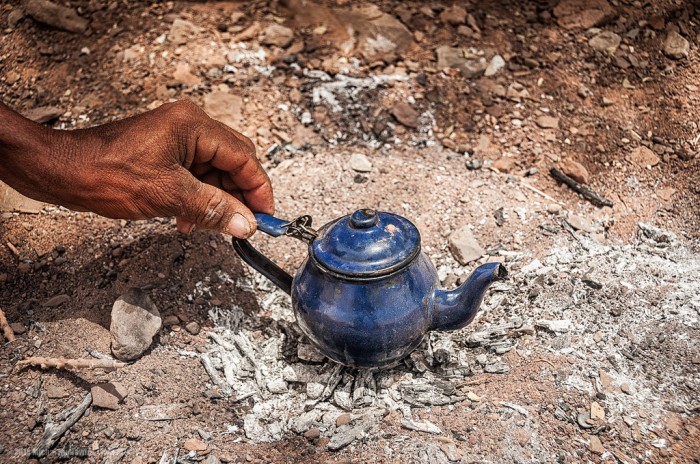“The Butter Caravan”
Several villages in the Zanskar, an area in the North of India, are isolated from the rest of the country most time of the year. The only way to reach them is by walking on the frozen river. Locals trade the yak butter they produce and they carry it on handmade carts.

“When I was 11 years old I was invited to a friend’s place in a little village not far from where I lived, in Sardinia. My friend and I decided to explore our surroundings for a couple of days and spent one night outdoors. His father recommended us to stay around, so that he would pick us up the next day. In fact, we stayed out for four whole days. My great passion for traveling and exploring sprang up in that very moment.”
That was 54 years ago. Sergio Soro, now 65 years old from Cagliari, Italy, is a former technician for a telecommunication company. He retired ten years ago and since then spends every morning working out and exercising for his next running race in the mountains. The last one took place on the 6th of March 2016: he ran for almost fifty kilometres, including 2500 meters uphill. Though he did not win, he was extremely satisfied with the result.
“People keep asking me why I am always smiling – my answer is that I’m happy with what I have. I don’t earn a lot of money but I’ve adjusted my life habits to what I have. And surely, what keeps me so alive and gratified are my passions. I guess I’m lucky.”
Sport and traveling are two intertwined themes in Sergio’s life. Since he was very young he has always practiced sport and his interests have widened from trekking, to long-distance running, mountain biking, duathlon, climbing, canoeing and martial arts. His unconventional way of traveling matches perfectly with this sporty lifestyle. The first rule when planning a trip with his group of friends, with whom he shares the same passions, is to avoid big cities and comfortable hotels.
“If you want to experience the real essence of a trip this is the right way to travel – you need a direct contact with nature and with people.”

The first trip
Sergio’s very first trip dates back to 1967, when he was 17 years old. At that time, it was very unusual for teenagers to travel, since usually parents did not allow them to do it. But he was lucky. He told his father about his will to start a hitchhiking trip to the Netherlands, expecting a strict “no” as an answer. Surprisingly, despite his pretty conservative view of the world, his father agreed. Sergio still recalls his father’s words: “I’ll let you go. But remember that whenever you’re doing something stupid, you are aware of it and you know what the consequences are”.
Immediately after his father’s official permission, Sergio left his city, carrying a backpack with just few things in it. During his journey through Europe he travelled in the most disparate ways – such as traveling for six hours in a van container, together with his friend and two American guys.
When they arrived in Basle, Switzerland, the main junction to reach any place in Europe in the late sixties, they found a two-kilometre-long queue of hitchhikers.
People would place a sign on the asphalt with the name of the city they wanted to go to and would wait for a car to pick you up. “It was amazing. People there would just wait patiently and play the guitar”, Sergio says.
This spirit of freedom has accompanied him throughout all his life and travels.
Road to the African adventure
The very first trip strictly related to sport dates back to 1988, when Sergio and some of his closest friends decided to depart to the Algerian Sahara, close to the border of Niger. The landscape was breathtaking and in the Hoggar upland’s area there were several mountains that reached over 3000 meters height. They went climbing on cliffs and went trekking in the close areas.

During their stay in North Africa, Sergio and his company would sleep in a tent and a friend of them, a pilot, provided them with some dried food. They didn’t have a lot of money but they sorted things out with all the means they had. Even things like moving from a place to another were not granted: within a whole day only two cars would cross the dirt roads. Once they had to cross the desert and cover several kilometres in a shabby Range Rover’s trunk.
However, going to Algeria meant also being in contact with a culture completely different from his own.
Sergio admits that he started started traveling triggered by a great curiosity for any culture different from mine. “I’m absolutely fascinated by what is different from what I’m used to.”
From that trip, Sergio remembers enthusiastically their direct contact with the Tuareg people, a nomad population who lives in the Sahara desert. The group established a very profound relationship with a Tuareg man, their guide in the desert. They discovered, as people, they resembled each other. They were both very simple, able to adjust to any conditions: Sergio and his friends covered very unfavourable areas of the world, being able to manage adverse situations, like running out of food supplies, with the limited means they had; the Tuareg people had managed to survive in the hostile environment of the desert.
Although almost thirty years that have passed, Sergio’s memories are indelible: it’s impossible for him to forget even one single detail from those trips.
“I can’t forget the strong taste of the tea there. They drink it in small glasses and it’s really strong, like our espresso coffee. We had our Italian coffee machine with us. When we met the Tuareg guide for the first time he tried our coffee and he was extremely enthusiastic about it. From the day after onwards a tacit consent started: he would prepare tea for us and we would prepare coffee for him and for his family”, Sergio laughs.

The main life lesson that adventurous travellers learn is respect. “No matter the place you go, no matter whether you agree or not with what you see. You learn to respect the culture, the religion and the different customs. Respect the land you go to”, Sergio advises.
In forty years of non-stop traveling Sergio has covered several countries of the world, such as Peru, Bolivia, Venezuela, Mexico, Chile, Argentina, India, Nepal.
The frozen river and “The Butter Caravan”
Sergio gladly recalls the expedition to Zanskar, in Northern India, close to the border with Pakistan. The villages in that area, located in a 4000m height and hidden in the Himalaya mountains, are isolated from the rest of the country during most part of the year. The only way to reach them is during the winter, between January and February, when the temperatures are so harsh – between-10° up to -35° – that the river that connects the area to the other side is frozen.
This path is also called “The Butter Caravan”: entire families every year cross the river to trade the characteristic butter they produce, made out of yak milk.
The walk on the frozen river was challenging but the local guides were experts and made the travellers feel safe. Every morning, after everyone packed the tents where they had spent the night, the guides would test the reliability of the ice by knocking on the river’s surface with a wooden stick.
After days of trekking they finally reached Padum and the other neighbouring villages, the locals, called “Zanskar Po”, hosted them in exchange of a little money.
Despite the temperatures and the harsh life conditions, these people seemed constantly happy. “The fact that they were always smiling amazed me”, Sergio says.
For Sergio, these trips are not only the opportunity to practice the sports he loves. Every trip is a chance to meet new cultures and to merge with them. He gets really irritated when people who have never traveled judge cultures they don’t know. “I’ve lived in close contact with Indios of the Amazon forest when I was in Ecuador. Western people who speak out of ignorance consider them as uncivilised. In fact, they have a beautiful culture and they have taught me a lot – like learning not to complain and to be happy with what I have.”
Pictures credits: Sergio Soro
Great story – powerful and well written!
LikeLike